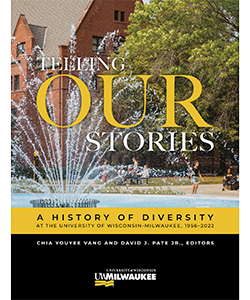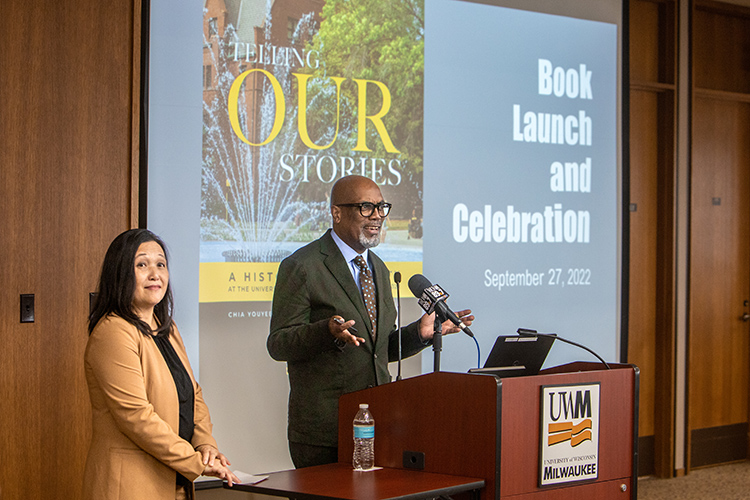By Kathy Quirk
Photo by Elora Hennessey
A standing-room-only and very diverse crowd was on hand Tuesday, Sept. 27, for the launch of a new history book that highlights how UWM became a diverse campus over the past six-plus decades.
“Telling Our Stories: A History of Diversity at the University of Wisconsin-Milwaukee, 1956-2022” traces the university’s growth through chapters exploring the experience of people who are of color, female, LGBTQ and from other countries, as well as those with disabilities and military backgrounds.
The book presents a picture of how the university was pushed to improvements by complaints about racial and gender bias, as well as areas where members of the UWM community are still concerned about issues of diversity, equity and inclusion.
Joan Prince, vice chancellor emerita, developed the idea for the book when she was dusting off and reading previous history books as she prepared to retire. A series of conversations with other leaders about the ways diverse groups have contributed to UWM led to the idea of a book that would help the entire community learn more about the diverse groups on the campus and their impact over the years.
“We needed another history book to tell our story of inclusive learning from those who lived it,” Prince said.

Chancellor Mark Mone notes in the book’s introduction that UWM is simultaneously the most diverse campus in the University of Wisconsin System, one of the nation’s top-tier research universities and one of the nation’s top universities for community engagement.
In introducing the book at the launch event, Mone stressed the university has intentionally worked toward diversity, equity and inclusion. “It doesn’t happen accidentally.”
And while the book highlights the movements and people who helped make the campus what it is today, Mone added, “We are not there yet. We still have room for improvement.”
Chia Vang and David Pate served as editors for the teams of writers who produced each chapter, with the help of a research team from the Archives Department at the Golda Meir Library. Vang is vice chancellor of diversity, equity and inclusion and professor of history at UWM; David Pate is associate professor and chair of the department of social work in the Helen Bader School of Social Welfare.
Most of those attending the event hadn’t had time to read the entire book, but were busy looking through it, recognizing familiar faces and getting autographs from the editors and writers.
“It was very interesting to me to read about the people who have come before me,” said Crystal Carter, a clinical associate professor and social work field liaison in the Helen Bader School of Social Welfare.
“I was focused first on the portion that was about our history,” said Alberto Maldonado, director of the Roberto Hernández Center, referring to the chapter about Latinos at UWM. “It was good to remember why we exist.”
Anique Ruiz, WiscAMP STEM-Inspire program manager, is a two-time Panther alumna. The book resonated with her “as the daughter of a mother who was one of the first Black UWM cheerleaders in the late 1970s and a grandmother, who in the 1960s drove with her colleagues from Kenosha to attend teacher certification courses.”
“I am incredibly proud ‘Telling Our Stories: A History of Diversity’ and the wonderful contributors to this great work. I am especially grateful for Vice Chancellor Emeritus Dr. Joan Prince, who commissioned the book, and our talented vice chancellor for diversity, equity, and inclusion, Dr. Chia Youyee Vang, for her hard work with Dr. David Pate to create such a legacy book,” Ruiz said.
“UWM will never be the same after.”
Copies of the books are available at no charge for as long as supplies last. Stop by Chapman Hall, Room 118, during business hours on Mondays or Wednesdays.
